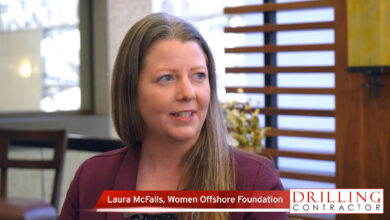Next-gen petroleum engineering students: Flexibility, growth and culture among key motivators
Students share personal perspectives of how they chose their majors and what’s influencing their choice to start an oilfield career

Staff Report
One of the biggest challenges the oil and gas industry faces today is attracting and retaining younger talent. Even though hydrocarbons are expected to remain part of the energy mix for decades to come, it has become increasingly difficult to get younger voices to buy in.
At the IADC Annual General Meeting in Austin, Texas, on 9 November, four petroleum engineering students – from the University of Louisiana at Lafayette (ULL), University of Wyoming, Louisiana State University (LSU) and Texas Tech University – shared their perspectives on how the industry can help address that challenge, as well as their own stories about how they are making their career choices. All four students are currently studying petroleum engineering and hold leadership positions at IADC Student Chapters at their respective schools.
For some of these students, even though they knew they wanted to become engineers, this industry was barely on their radars at first – perhaps they grew up far away from the oilfield, like Patrick Stapleton from LSU and Clay Ostrander from ULL. For both of them, it was through talking with people who knew about the industry and learning about opportunities for travel and flexible work schedules that brought them into oil and gas.
They were also attracted by the diversity in potential careers, even just within the oil and gas sector, when selecting petroleum engineering as their major. “You’re not siloed into one specific discipline. You can go worldwide, you can do drilling, you can do production, you can do reservoir. It’s up to your personal decision of where you want to go,” Mr Ostrander said.
Another student, Cody Zayonc with the University of Wyoming, pointed to the practice of petroleum engineering itself as the thing that attracted him the most. “I knew I wanted to be an engineer, but when I started looking through all the options, quite a few of them seemed pretty boring,” he said. “When I came across petroleum engineering and saw what they do, just from an engineering standpoint, it seemed to be the most exciting. It’s kind of mind-blowing what petroleum engineers can do.”
Sarah Qureshi with Texas Tech had a similar perspective, pointing to innovation and opportunity as what motivated her to choose this industry. “I also appreciate the chance to work with the most hard-working individuals that you’ll probably ever meet,” she added. Ms Qureshi, who has already had two internships with ConocoPhillips, is slated to join the operator full time upon graduation.
Seeing the potential
While these next-gens are excited about beginning their oilfield careers, they acknowledge that it can be an uphill battle explaining their choices to other people in their generation. “The big thing I always hear, especially from other engineering majors, is that we’re pigeonholing ourselves and that it’s too narrow of a field,” Mr Stapleton said.
His personal experience tells him otherwise, however. “At Chevron, if you go to a different floor, it’s a completely different world. You can be talking to production or land management or drilling and completions. There are so many skills that can become applicable in other fields that I don’t think it’s nearly as narrow as people tend to think it is.”
For Mr Zayonc, whenever he gets questioned by peers on his career choice, he not only takes the opportunity to clear up any misconceptions about oil and gas, but he also flips the conversation and tries to convince them to join.
“I know there’s more than enough jobs because of all the people we need, so if I can try and pull them in, that’s good for me and them,” he said. “Even beyond the technical engineers, there are also a lot of people on the support staff side, and everyone I’ve met has been very happy to be in this industry and want to stay in it. I always tell my peers, why don’t you give it a shot?”
Personal connections and stories like that have always played a key role in oilfield recruitment, and will likely continue to, but the industry will also have to expand its outreach in order to better engage with the next generation.
This may include targeting people in areas that are outside of the traditional oil and gas states like Texas, Louisiana and Oklahoma, Mr Ostrander said. People who don’t live in those areas are much less familiar with this industry and will require more outreach and education in order to understand what opportunities are available.
“To get inside that bubble, you kind of have to take a leap of faith,” he said. “I grew up on a farm and I had many other friends who grew up on a farm. They’re hard workers, and they would thoroughly enjoy the adventure of working in the oil and gas industry. They just didn’t know that’s a possibility.”
Looking to their own future careers, all the students agreed that they put a premium on positive leadership and culture when selecting their workplace. “For me personally, culture was pretty much everything,” Mr Stapleton said. “I went off of more how they interacted with me personally and not so much the technical side of the interview. It’s more about, is this a friendly person that I’ll want to come in and work for everyday?” DC




